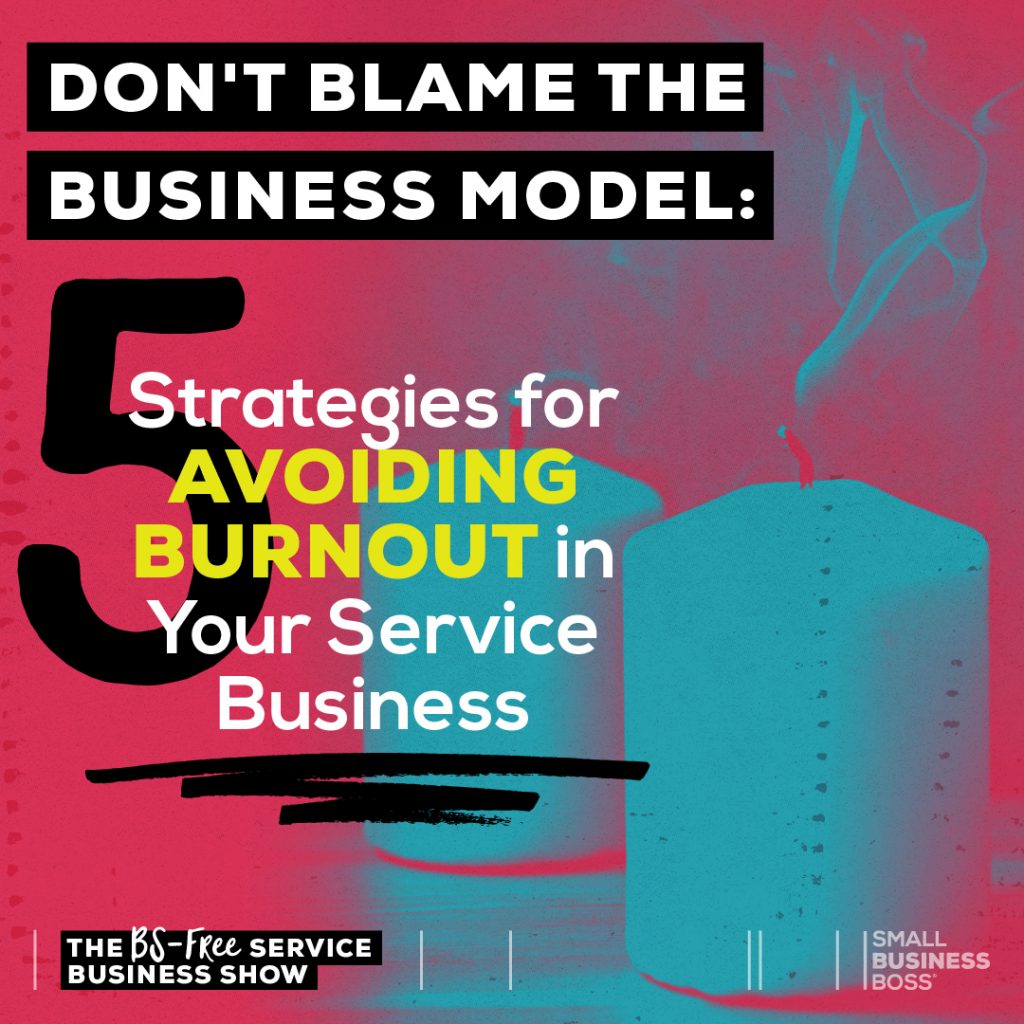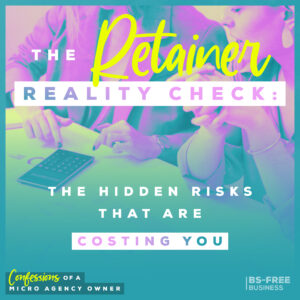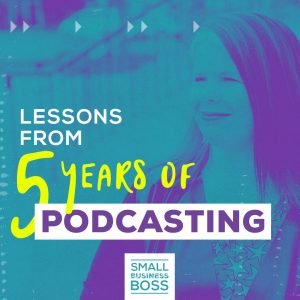
Search the site:
Don’t Blame the Business Model: 5 Strategies To Avoid Burnout in Your Service Business
Burnout isn’t inevitable when you run a service business, no matter what people want you to believe. In this episode we’re talking about why working with clients isn’t a recipe for burnout and five strategies for avoiding burnout in your service business.
Recently, I talked about how I’m so tired of the online celeb gang using service businesses, working with clients, or “trading time for dollars” as the villain in their marketing.
A big part of that story tends to focus on the fact that burnout is inevitable when you work with clients, and how to have a thriving business, you need to do something else. That you need a course or a program so you can stop working with clients and escape burnout.
After listening to this story for eight long years, I’m over it. And I’m here to call it out and have a heart-to-heart about how the business model isn’t the problem.
We need to stop blaming the business model of working with clients for all of our problems, and instead look at why and how we end up burnt out.
The reality is that you CAN have a service business not hustle yourself to death. You can take a vacation, weekends off and more. In fact, you can do much more than that. The point of having a business is that you make the rules and you can work the schedule you want, take time off and much more. I’m proof and many of my clients are too, so it’s time that this myth dies.
Before we dive right into strategies for avoiding burnout, I do want to point out the fact that burnout happens in many other types of businesses, including the types of businesses that we’re supposed to build in order to prevent burnout. (Oh, the irony.)
What Exactly Burnout Is
Burnout has become a catch-all for an entire host of feelings we experience as business owners, but I first wanted to clarify what exactly burnout is.
According to Thisiscalmer.com “burnout is the loss of meaning in one’s work, coupled with mental, emotional, or physical exhaustion as the result of long-term unresolved stress.”
I love this definition of burnout as it shows just how nuanced burnout really and truly is. It’s much more than being tired or needing a break. It’s about being truly exhausted and lacking meaning. It’s much more than the reductive trope we hear about service businesses.
If we look at job burnout, there are five stages outlined by Veninga and Spradley in 1981. Their model shares five levels starting with honeymoon and then going from balancing act to chronic symptoms to crisis to enmeshment.
As business owners, it’s not hard to see why or how burnout could happen, especially when you look at each of these stages.
The Business Model Isn’t the Problem
I do believe burnout is incredibly real and avoiding burnout is something we need to work on consistently, but blaming it on the business model is flawed at best. There are a multitude of reasons that lead those of us who work with clients to become burnt out, many of which will not be fixed by shifting to courses or programs.
I know there have definitely been times I’ve struggled with loss of meaning and feeling exhaustion, but when I look at the five stages, I was definitely at stage two at the very most.
In that balancing act stage, I was stressed and fatigued, which required me to adjust my habits, workload and the way I worked with clients.
The fact is that simply abandoning working with clients wouldn’t have fixed the underlying issues. And no matter what stage of burnout we may be at, we need to think critically about how and why burnout has happened, and not simply blame the business model like the celeb entrepreneurs want us to.
I’m sure many of you have felt burnout creeping in. If the business model of working with clients isn’t the problem, then what is? And more importantly, how do we set ourselves up so we’re avoiding burnout as much as possible?
Let’s dive into five strategies for avoiding burnout in your service business.
Strategy #1: Boundaries, Boundaries and More Boundaries
Those of us that work with clients tend to be givers. We get immense satisfaction out of helping people, and that, my friends, can lead to issues with boundaries.
Plus, for many of us, we have beliefs or even past experiences that result in us having breachable boundaries. This may be that we don’t enforce boundaries, we bend boundaries or we simply don’t have them in places where they’re essential.
In talking about boundaries, I’m not going to pretend that clients that disrespect boundaries don’t exist. And we’ll talk more about those types of clients in a second.
I know for me, and probably for most of you, that the bigger problem with boundaries is an internal one, and not one dictated by our clients. It’s really easy for us to blame someone else, when really, boundaries are an inside job. And they require constant care and tending.
For each of us boundaries may be different, but a few must-have boundaries for service-based businesses are:
- Work hours including vacation and weekends
- Response and turnaround times
- Communications channels
- How feedback should be provided
- Healthy lines between personal and professional with clients
- Use of tools and systems
Think of your boundaries as your rules of engagement for how you work with clients. They shouldn’t just be the bare minimum, but instead a clear, consistent container for how your relationship operates.
From time to time, boundaries will slip, and just know it’s always okay to reset or establish boundaries as needed. Clients will respect your boundaries if you hold to them, so don’t get too comfortable and make things harder for yourself than they need to be.
With the right boundaries in place, you can avoid that feeling of constantly having to be on your email or taking calls at all hours. You can create a relationship that leaves room for you to rest and recharge as needed so you’re avoiding burnout.
Strategy #2: The Types of Clients You Work With
In past episodes, I’ve talked a lot about how over the last five years I’ve changed the types of clients that we serve. A big reason for that was finding the right fit of clients for me and how I like to work.
When I worked primarily with B2E clients, I found myself dealing with a number of unrealistic and demanding clients that questioned my counsel and expertise regularly. I came to realize that no matter how much we’d screen clients, a lot of this was the nature of the industry.
From there we experimented working with small businesses, but I quickly discovered that working with people who weren’t marketing savvy resulted in a lot of handholding that I wasn’t prepared to provide.
It’s not that either of these groups were bad clients per se, they just weren’t the right type of clients for us at Scoop, and for my personality. Recognizing the type of relationships you want with clients is critical to guarding against burnout.
What I found is that for me and the Scoop team, working with tech, corporate clients is a recipe for success. As a group, these clients are more aligned with how we like to work, and that means there’s lower overall stress for all involved.
Finding a way to work with less stressful clients means there’s a higher likelihood of avoiding burnout for me. Remember, stress is a key component of burnout as you simply can’t stay in a stressed state indefinitely without your mind and body telling you enough is enough.
Strategy #3: Revamping Your Workload
When you own a business, there’s this weird push/pull between the messages of needing to hustle your face off in order to succeed, and then the idea that you can manifest the business of your dreams.
The truth lies somewhere in the middle. Work is definitely required to build and sustain a business, but it doesn’t require epic 16-hour workdays and endless billable hours in order to reach your goals.
Not even close.
As a service-based business, one of the best possible ways for avoiding burnout is to work with fewer clients. When you have too many clients, there’s simply a point at which your brain no longer can handle it. You become too fractured and you waste a large portion of your workday trying to figure out what you’re doing.
This is particularly true if you work as solo business owner or with a small team. I recently was talking to a client who runs a micro agency and she was listing off all of their clients and I felt myself starting to get stressed out for her.
She was struggling with some internal project management issues, and I ended up telling her that this was the result of their being too many clients and too many potential points of failure. Plus, the more clients there are, the more fatigue sets in, and then the harder it is to make decisions, resulting in a vicious circle.
Listen, I don’t care how good you are at what you do, at the point you have 10 or 15 or even 20 clients, there’s no magical tool that can make that work. The key is working with fewer clients and charging them more for your services, because if you can sign that many clients, you can definitely raise your prices as you’re in demand.
The other part of revamping your workload to help with avoiding burnout is figuring out what tasks energize you, and which ones drain you. The goal being to focus more on the ones that are energizing and the ones that drain you can be handed off to someone else.
Even if you’re a solo show, handing off something like bookkeeping that’s completely draining you can be a huge win. The key is figuring out what items you need to get off your list and to pass them off to someone else.
And if you suffer from a case of “no one can do it like me”, let me tell you right now that’s some garbage. I challenge you to re-think that, as that type of thinking is a literal one-way ticket to burnout-ville.
Strategy #4: Set Goals That Serve You
There’s nothing, and I mean nothing that can send you into a burned out state than pursuing goals that don’t serve you.
Take for example a revenue goal. Many times we pick an arbitrary revenue goal for the month or quarter as that’s what we think we should be doing. That we should be growing our revenue continuously as that’s what you do when you run a business.
However, that’s just hustle and capitalism telling us that. So many times we set goals that actually don’t serve us because that’s the norm. We’re supposed to want more and more, and so we work our asses off to try to hit goals. Then, once we reach them they feel pretty empty.
And revenue goals are just one example where this happens. So many of the things we set up in our business are the next badge we want to unlock, but it lacks real meaning for us, and it’s not tethered to the rest of our lives.
When setting goals, you need to focus on what will serve you. Maybe it’s more time off, a long vacation, working fewer hours, starting a new and exciting project you’ve been putting off or something else entirely. When you focus on a goal that’s in service of you, you don’t feel as trapped or hopeless. You feel empowered and are better positioned for avoiding burnout as you’re not needlessly hustling towards a hollow goal.
Strategy #5: Find Meaning in Your Work
A key element of burnout is the loss of meaning in your work. Think about it. If you’re running a business day in, day out and it feels meaningless, it’s easy to slip out of the “honeymoon” stage and into the one of the other four stages.
When I talk about meaning, I’m not recommending you go looking for something deep. The truth is that for many of us, while we enjoy what we do, our work isn’t that deep. It’s the means to an end, and that’s okay.
In a world that talks about “passion” in our work, this can be a hard one to come to grips with, but the sooner you let go of it having to be all that deep, the sooner you can find meaning in what you’re doing.
As someone who’s 15+ years into having a business, I continuously need to find ways to find meaning in what I’m doing. For the agency, that’s about doing work that’s aligned with my vision and values while having the life I want. For Small Business Boss, my meaning comes from being of service to my podcast listeners and the wider community.
My meaning isn’t about saving the world. It’s about making my part of the world that much better, and making a contribution in the process. It’s not super deep, but it has meaning to me.
That meaning helps me keep on, keepin’ on even when I’m feeling drained or like things are kind of pointless, because we all have our days. It’s less of a struggle to try to find satisfaction in my work while being committed and creative because I get why I’m doing what I’m doing.
Burnout is Complicated, But the Business Model Isn’t the Problem
The truth is burnout is complex and nuanced, so if you feel yourself creeping along the stages, it’s time to make some changes. And most of all, realize that it’s okay to slow down. It’s imperative that you rest and realize that there are no gold stars for burning out on the way to trying to reach your dreams.
The story of the burnt out entrepreneur is so prevalent, that we’ve been trained to think that it’s a necessary condition of success. You can build a service-based (or any other) business without burnout being required.
Avoiding burnout starts with understanding how it works, and how we can inadvertently send ourselves on the path to chronic or crisis level burnout without realizing it.
Links for this episode:

I’m Maggie Patterson (she/her), and services businesses are my business.
I have 20+ years of experience with client services, am a consultant for agency owners, creatives, and consultants, and vocal advocate for humane business practices rooted in empathy, respect, and trust.
Read or Listen to the Latest
For Solo Business Owners

Growing a solo service business is tough.
It’s even harder when you’re bombarded with BS advice that steers you away from your values and why you started your business in the first place.
This is the podcast for solo creatives and consultants who want to remain as a team of one and have zero interest in the hustle and grind of typical business teachings.
Subscribe now and never miss an episode.
For Micro Agency Owners
Most podcasts for agency owners obsess over revenue growth as the ultimate success metric.

But here’s the truth: not everyone wants to make millions. Your goal might be to build a sustainable business that lets you have a life and doesn’t run you into the ground.
Join me as I spill my shameless confessions and share everything I’ve learned about building a micro agency that skips the BS of tired and typical agency teachings.
Follow Now on All Major Podcast Platforms








